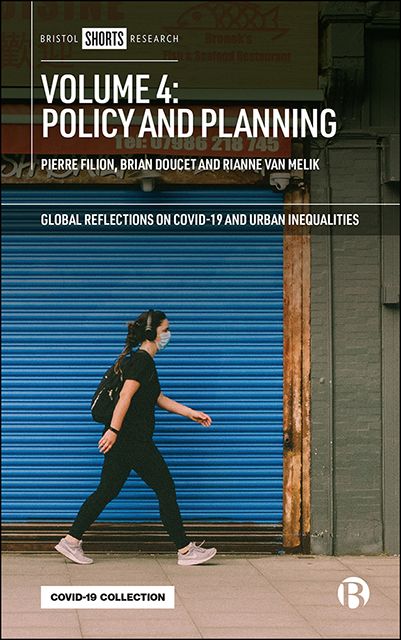Book contents
- Frontmatter
- Contents
- List of Figures and Tables
- Notes on Contributors
- Acknowledgments
- Preface to All Four Volumes of Global Reflections on COVID-19 and Urban Inequalities
- One Introduction: Policy Making in the Face of Uncertainty and Inequality
- Part I COVID-19 and Urban Changes
- Part II The Pandemic, Social Inequality, and Mobilization
- Part III Municipal and Urban Policy Responses
- Index
Seven - Urban Inequalities and the Lived Politics of Resilience
Published online by Cambridge University Press: 25 April 2023
- Frontmatter
- Contents
- List of Figures and Tables
- Notes on Contributors
- Acknowledgments
- Preface to All Four Volumes of Global Reflections on COVID-19 and Urban Inequalities
- One Introduction: Policy Making in the Face of Uncertainty and Inequality
- Part I COVID-19 and Urban Changes
- Part II The Pandemic, Social Inequality, and Mobilization
- Part III Municipal and Urban Policy Responses
- Index
Summary
Introduction
In an age of COVID-19, with the urban crisis revealing itself in the new epidemic form, the notion of urban resilience has once again become prominent. It remains a central component to the pressing questions of what mechanisms facilitate or impede cities’ abilities to withstand the crisis, whether cities can ever return to ‘normal’ after the pandemic and whether a return back to the old normal is even desirable. However, the concept of resilience has been accused by critical scholars of being post-political, ‘normalizing’ crisis, propping up the status quo, and neutralizing calls for transformation.
This chapter queries the possibility of deploying urban resilience as a critical concept to interrogate the politics of urban crisis, like that faced with COVID-19. In so doing, we offer a framework for a critical epistemological deployment of resilience to actual urban practices that may re-politicize the very conditions leading to cities being resilient, through the notion of the lived politics of resilience. Urban resilience in this reading is viewed not merely as a system's mechanistic or naturalistic traits (that is, the abilities to withstand a disturbance) or a set of normative principles (how to boost such abilities), but rather as the actually experienced processes and politics of conditioning, negotiating, and surviving an ordeal. The chapter explores possibilities of reconciling the theoretical, practical, critical, and lived perspectives on (urban) resilience.
Pandemics, urban inequalities, and resilience
Originating in engineering and ecological sciences, the idea of resilience can be defined as ‘…the ability to absorb change and the capacity for re-organization or adaptation in the face of disruption’ (Cretney, 2014: 629). More specifically, urban resilience ‘…refers to the ability of an urban system – and all its constituent socio-ecological and socio-technical networks across temporal and spatial scales – to maintain or rapidly return to desired functions in the face of a disturbance, to adapt to change, and to quickly transform systems that limit current or future adaptive capacity’ (Meerow and Newell, 2019: 315).
For most policy makers, like in the case of the financial crisis of 2008, COVID-19 demonstrates the importance for cities to develop resilience – or a city's abilities to withstand shocks of different kind and nature in a way that does not threaten the city's well-being and prosperity. But both crises have highlighted that these abilities are structurally uneven.
- Type
- Chapter
- Information
- Volume 4: Policy and Planning , pp. 69 - 78Publisher: Bristol University PressPrint publication year: 2021



